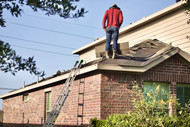Silicone Sealant for Roofing: Everything You Need to Know
May 31st 2023
When it comes to roof coatings, silicone sealant is the go-to material for many roofing contractors. Not only is this resilient material used for fixing roof leaks, but it’s also strong enough to resist the toughest weather conditions. It’s an excellent sealant for outdoor use. This makes it ideal as a protective layer over a building’s roof, which often bears the brunt of weather damage.
There are many reasons you might want to use outdoor silicone sealant for your roof. But before you jump in on your next roofing project with your caulk gun, you'll need to know the basics of silicone roofing. In this blog post, we’ll review everything you need to know about silicone sealant for roofs.
Why Use Silicone For Roofing?
You can find roof sealants made from rubber, polyurethane foam, tar, and acrylic. Each of these materials has its own pros and cons, but which one is the best? This typically depends on the structure’s location. For example, polyurethane is water-resistant but not sunlight resistant. So, it’s best used in areas that get a lot of rain and not much sunlight.
Silicone sealant is different from many materials in that it can be used in a variety of outdoor environments. Silicone sealant is the best all-around adhesive, but in certain specialized situations, you may opt for a different solution. We’ve outlined the pros and cons of silicone roofing to help you narrow down your client’s needs.
Pros
Silicone has many features that make it a necessity for contractors. When it comes to roofing, there are specific benefits to using this versatile sealant.
Extends Roof’s Lifespan
Silicone sealant provides an air-tight seal that’s weather, water, and heat resistant. When properly applied, it lasts up to 20 years. If your client already has a roof in good condition, a silicone membrane is an effective way to make the roof last longer. By taking preventative measures with a silicone roof coating, your client will also save money in the long run on costly repairs.
Weather Resistant
Many water-based roofing fail in the face of a downpour of rain. Puddling roof water causes the coating to swell, liquify, and crack when exposed to moisture. UV rays can also wreak havoc on acrylic coating, causing it to blister, crack, and peel away. Silicone sealant won’t peel or crack. This durable adhesive is waterproof and UV-resistant, so you can have peace of mind knowing a bit of rain won’t ruin your hard work.
High Solids Content
Silicone roofing is often available as HS (High Solids). This means there is more silicone per gallon left on the roof after curing, and less coating material is needed to achieve the desired coating thickness. You can also find solvent-free HS silicone, which will ensure an even stronger seal. By using HS silicone, your team can complete a coating job with just one layer of silicone, saving on time and labor costs.
Cons
Silicone sealant is a versatile tool for roofing, but it’s not always the best choice. Here are some factors to consider when deciding whether or not to use silicone roofing:
Slippery
Silicone dries down smoothly on surfaces. Normally, this is a good thing, but if there are workers on the roof after installation, it could be a safety concern. After the rain, the roof’s surface will be especially slippery. If you anticipate work on the roof after silicone application, it’s important to make your workers aware of the issue. Constant foot traffic could also cause the silicone to wear down early. If you’re consistently going to have workers up on the roof, you might consider a different roofing material.
For Flat Roofs Only
Generally, silicone roofing works best on flat roofs. Although you can apply it to different parts of a non-flat roof, it will be much more challenging to get an even finish. Although silicone sealant can be applied to any kind of roof to fill individual cracks or holes, a full coating is difficult to apply on a pitched roof.
Expensive
For many contractors, the biggest deterrent for using silicone sealant on their roofing projects is the price. There’s no doubt silicone sealant performs better than other adhesives, but it’s also much more expensive. The cost of coating is only amplified when considering buying in bulk.
If you have to work on a budget, you might prefer cheaper alternatives to silicone. But you shouldn’t write off silicone just because of the price. Instead, turn your search online! If you’re looking for affordable, high-quality silicone, Silicone Depot has the right products for you. Our Premium 100% RTV in buckets and pails is ideal for roof applications. With bulk discounts and free shipping available, you can get superior silicone without breaking the bank.
Start Your Roofing Project With Silicone Depot
Silicone Depot has what you need for your next construction job. Our extensive range of silicone sealants guarantees exceptional performance and long-lasting durability. Choose Silicone Depot as your supplier today and enjoy the best prices and highest quality on silicone sealants and more!

